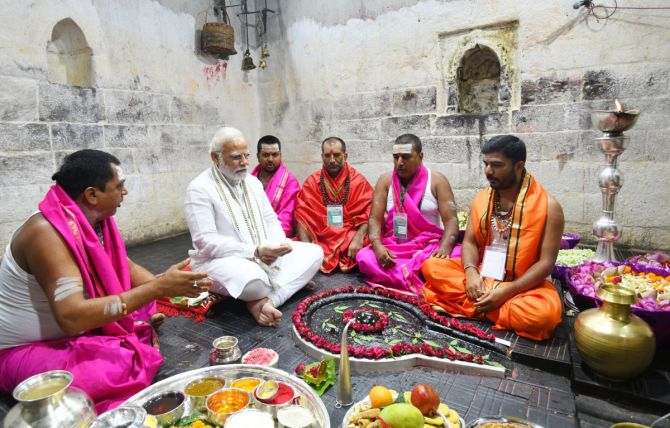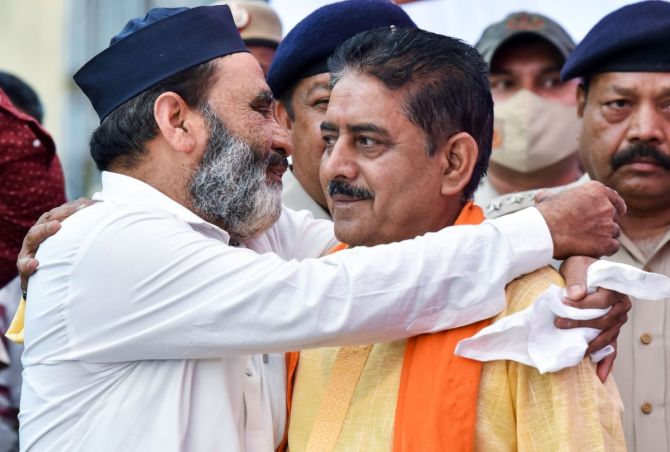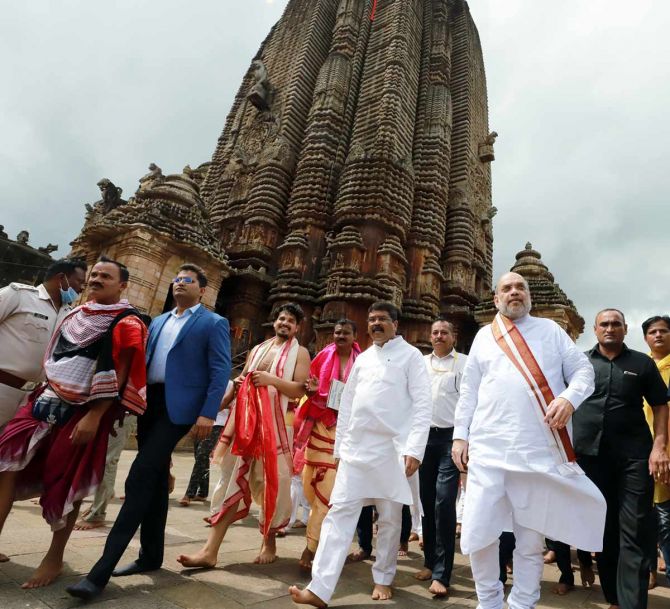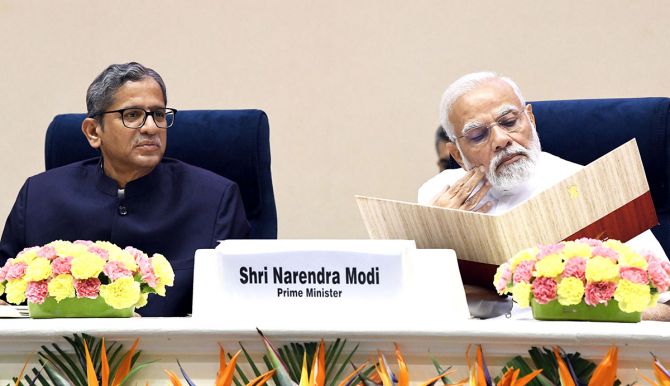The future challenger to Narendra Modi would be somebody who can bring the Hindus and Muslims together again.
The Hindus as Hindus, not broken caste groups, asserts Shekhar Gupta.

Can politics reunite what religion divided?
This draws from our central argument-- that since the decline of the Congress as the dominant political force across states in 1989, power in Indian politics has fluctuated between two competing ideas.
That you can use caste to divide what religion united. Or religion to re-stitch what caste divided.
For about 25 years, caste dominated. But in 2014, religion won that battle for the Hindu vote in our key large states.
All other disputes and debates, Mathura-Kashi, blasphemy, kanwariya-hajis, or secular-communal in general have emerged as a consequence.
Narendra Modi has a shrewd understanding of this.
See, therefore, how he's setting a trap for his ideological rivals with a call to his Bharatiya Janata Party to reach out to backward classes/castes among India's religious minorities (translated, Muslims).
If his rivals successfully used caste to divide the Hindu vote for 25 years, couldn't he now similarly use caste to divide the Muslims?
Jujutsu, the art of using the adversaries' strengths against themselves, is an option available to both combatants in the ring.
The first 'secular' response to the trial balloon he launched at the recent BJP national executive meeting in Hyderabad might have been, fat hope!
Good luck to Mr Modi if he thinks any Muslims are going to vote for him, even if he reminds them ten times a day that they are pasmanda (backward) and that the dominant Ashrafs exploit them as much as the upper caste Hindus do with those lower down the ladder.
They may be right at least in the short run. But caste, and social discrimination based on it is also a strong sentiment for those at the receiving end.
At some point, it might begin to find some response. The BJP plays the long game.
They didn't field any Muslim -- at least not any serious candidate -- in any recent Lok Sabha and Vidhan Sabha election.
But note how they fielded several scores of them in the Madhya Pradesh local body elections.
Ninety two. Yes, 92 -- that isn't a typo -- Muslim candidates from the BJP won in MP. In a large number of constituencies, they won defeating the Congress candidates.
If you are the Modi-Shah BJP's rivals, victims or prospective challengers, you can ignore these points at your own cost.
See it like this. Fielding Muslim candidates even in the more consequential elections, the Lok Sabha included, might be a good idea for the BJP if its hold on the Hindu vote continues unchallenged. It will win in two ways.
One, symbolically and numerically, it will counter the charge that it's Muslim-mukt (devoid of Muslims), which is the truth now.
And second, even if a small percentage of the Muslim vote switches to it, it will bury the Opposition deeper still.

This is a challenge Mr Modi's rivals can't duck. If they move in to ring-fence the Muslim voters, it consolidates his Hindu base.
See, all these people claim to be secular, but all they care about is their Muslim vote bank.
If they don't, they risk attrition in the Muslim vote too. That's why we called it a trap by Mr Modi.
Further, even if the Congress or other pan-state parties avoid this, the new Muslim parties, Asaduddin Owaisi, Badruddin Ajmal -- and more such will emerge in other states -- won't.
Because the Muslim vote is all they can hope to get, and this will be an opportunity to take it away from its original recipients: The Congress, NCP, SP, RJD and who knows, at some point, the TMC too.
This fragmentation of Muslim vote will benefit only one political force, the BJP. It's okay if you'd never vote for me.
In Kerala, at some point, the Indian Union Muslim League will begin to worry if a new rival from Hyderabad walks in while it is still bound by the UDF coalition discipline and the Congress party's growing fear of being seen as pro-Muslim.

See how they responded to the triple talaq and hijab issues.
You will most certainly see a repeat as the Modi government moves in on other Muslim-specific family law issues like polygamy, maintenance for divorcees, special status for minority institutions, madrasah education and so on.
These moves are written on the wall. How will the Congress respond?
Its ideological waffling showed up in Kerala -- among the few states where it still doesn't confront the BJP and, therefore, has a chance -- over the Sabarimala issue.
To take the liberal and secular call and risk annoying Hindus or to back tradition?
It chose the worst possible option: Say or do nothing.
Rahul Gandhi did once speak out for gender equality instinctively and then they were all scurrying around covering for it saying it was his personal view not the party's.
Mr Modi has cornered his ideological opposition on to an island which is fast eroding as the waters rise with the political climate change. India's Muslims have been dragged along with them.
Where do you go from here? How will you fight Mr Modi for this political space?
You will be surprised if I told you how many -- and who all -- said, no point fighting.
The idea of the secular republic is over. You can't fight when the "Hindu majority has become bigoted".
Some young people have been so angry and hopeless they say the only way out is on a plane to the US, Europe, or even Turkey.
That, by the way, is a preferred destination for some.
Others say, one day Mr Modi's voters will realise they've been had and vote for us in sheer contrition.
This is wishful thinking for a strategy.
There are still others, neither seeking refuge in a Green Card nor with a fight in their guts who'd refer to the same Hyderabad speech.
See, Mr Modi is reaching out to Muslims. He also knows he needs social cohesion for success if he wants a place in history.
So leave it to him to accommodate the Muslims, the Israel-Arab style, and let's hope for the best.
This defeatism runs contrary to one important fact. No matter where politics of the day takes India, it will remain an electoral democracy.
Sometimes it would look authoritarian, sometimes anarchic. The game will be played broadly within this Constitution.

This is an open arena for ideas and ideologies contested by strong, ambitious and imaginative minds through competitive politics.
A contact sport is still played to some rules. India will never become a one-party regime forever, a Hindu equivalent of the Chinese Communist party-owned China.
There are and will be many in our politics who'd abhor the idea of a CCP-isation of India.
Nobody can defeat the BJP in post-2014 India without a sizeable enough section of the Hindus voting for them.
The era of having some of them voting as Dalits, Yadavs, tribals or other OBCs is over.
A challenger to Mr Modi will need to bring the Hindus and Muslims together again.
The Hindus as Hindus, not broken caste groups.
They will need to convince the Hindus that social cohesion, equality as enshrined in our Constitution, is the best thing for them, an1d India.
That the 'othering' of any fellow Indians is not only a cheap, un-Hindu like thing, but also fatally detrimental to our national interest.
It isn't easy. But the quest for power never is.
By Special Arrangement with The Print
Feature Presentation: Aslam Hunani/Rediff.com












 © 2025
© 2025